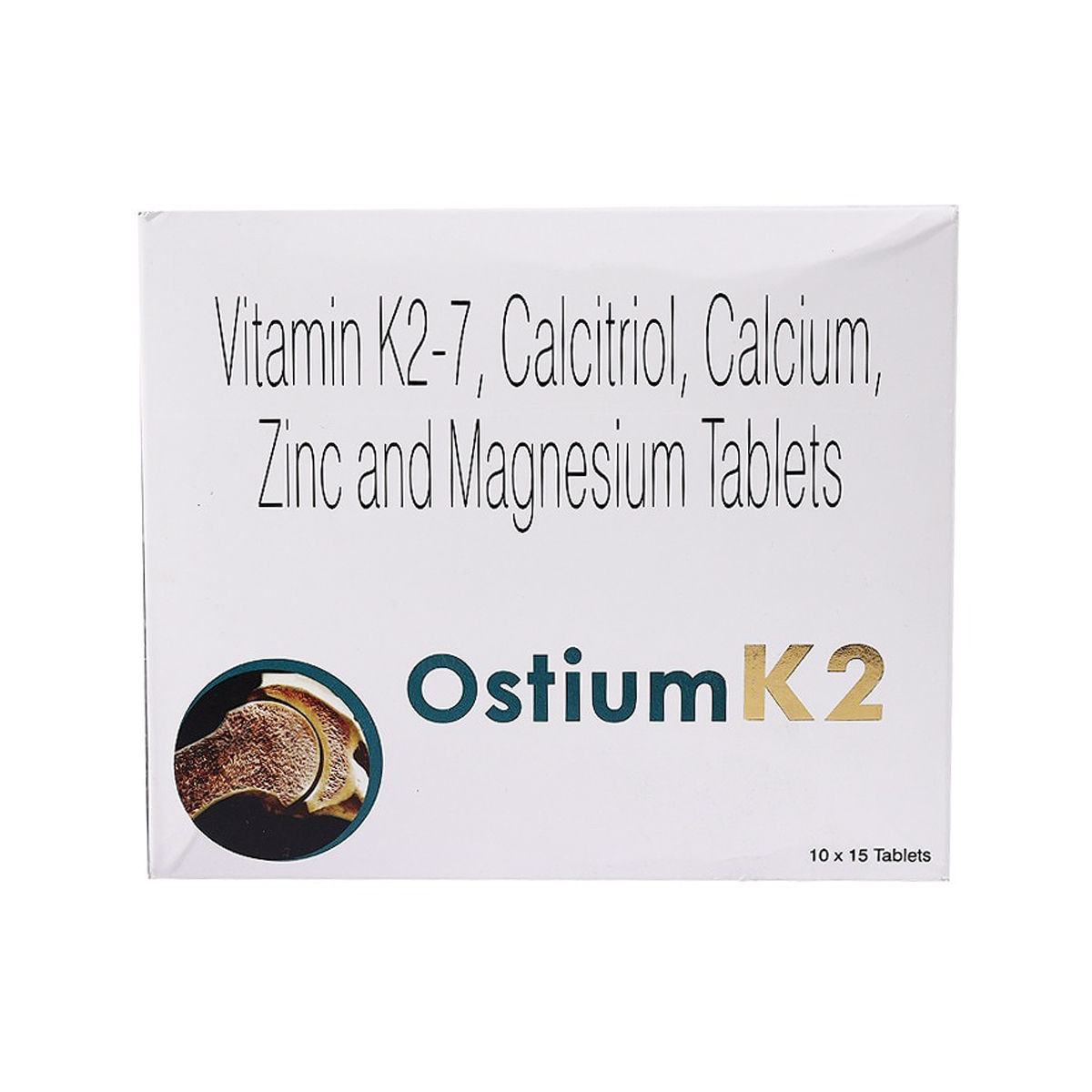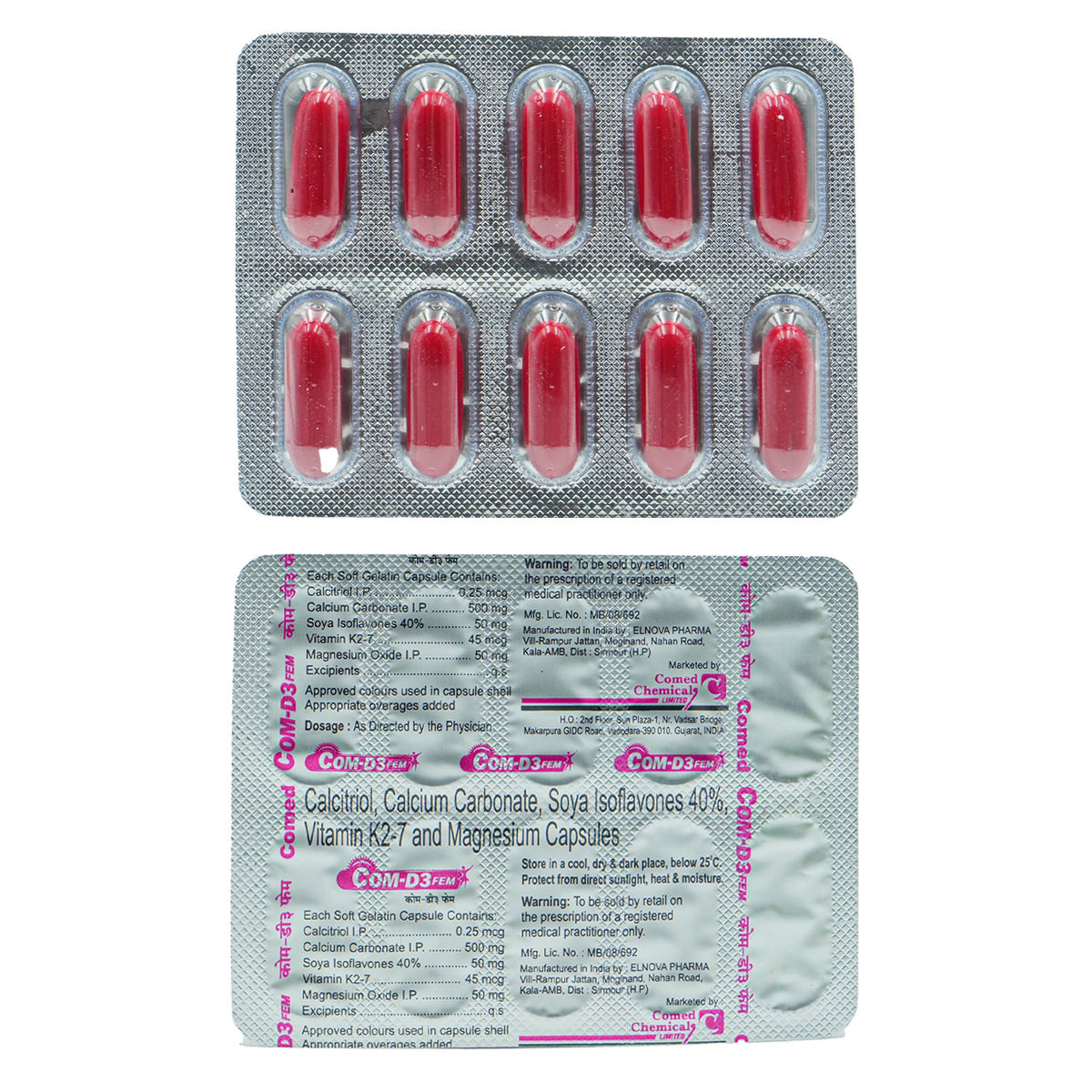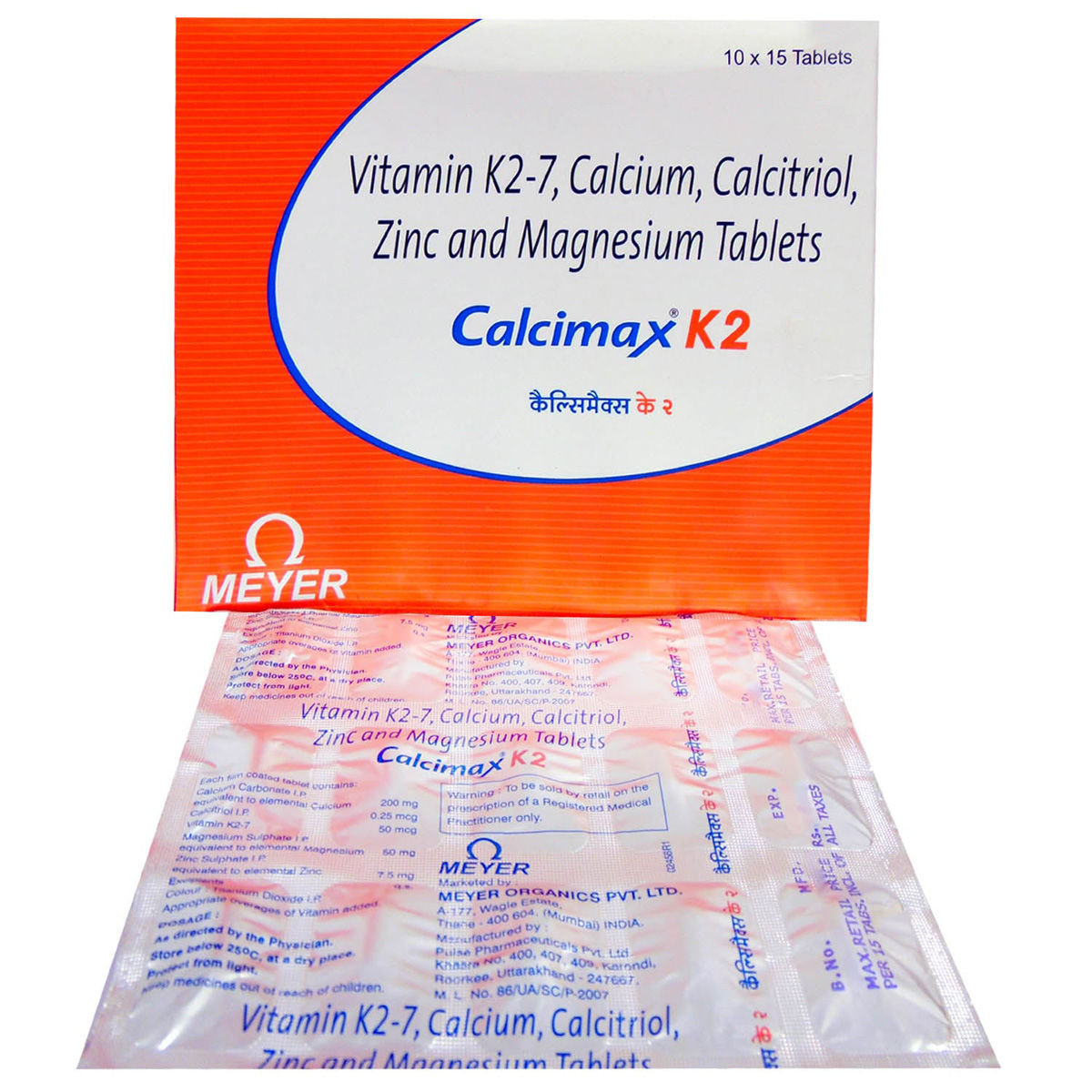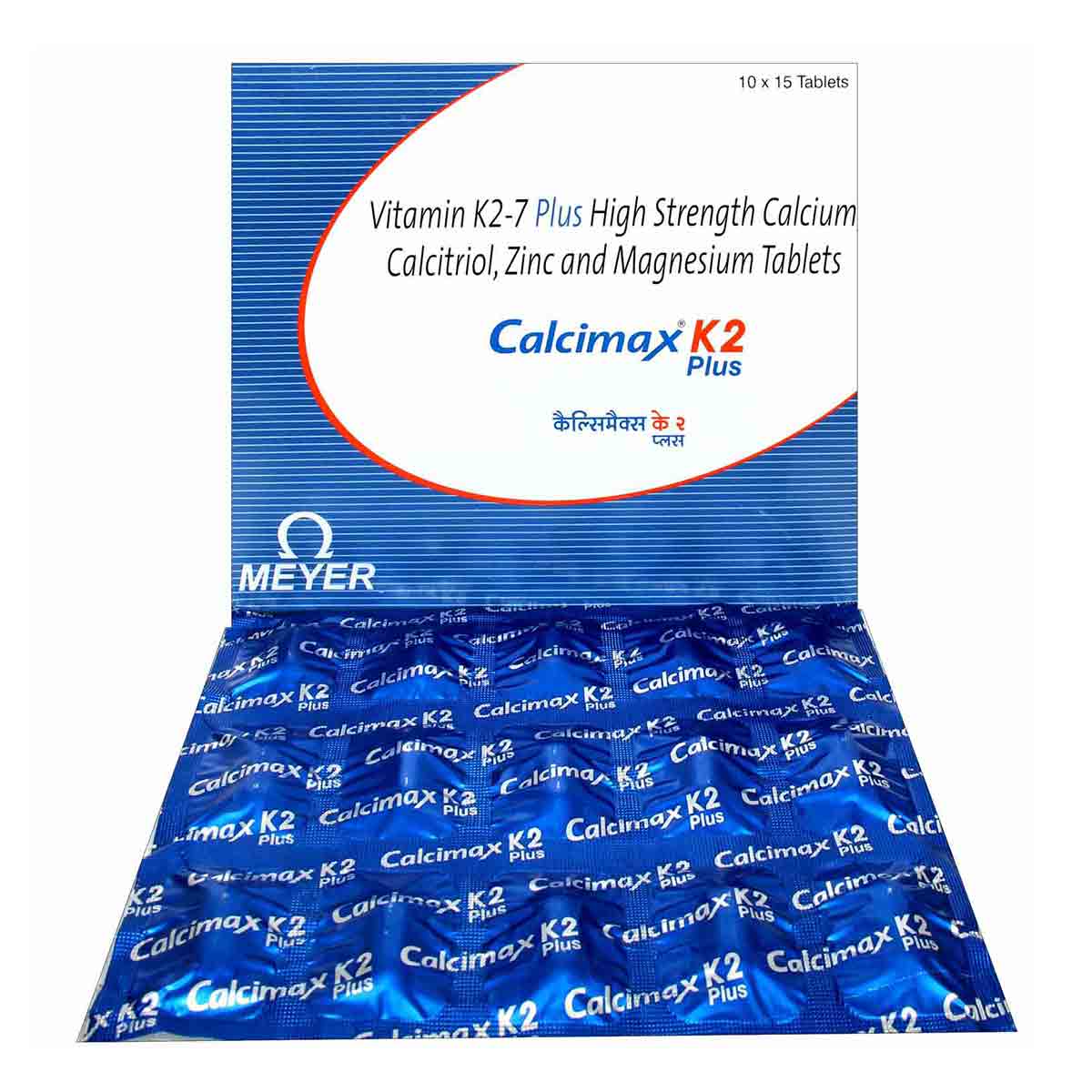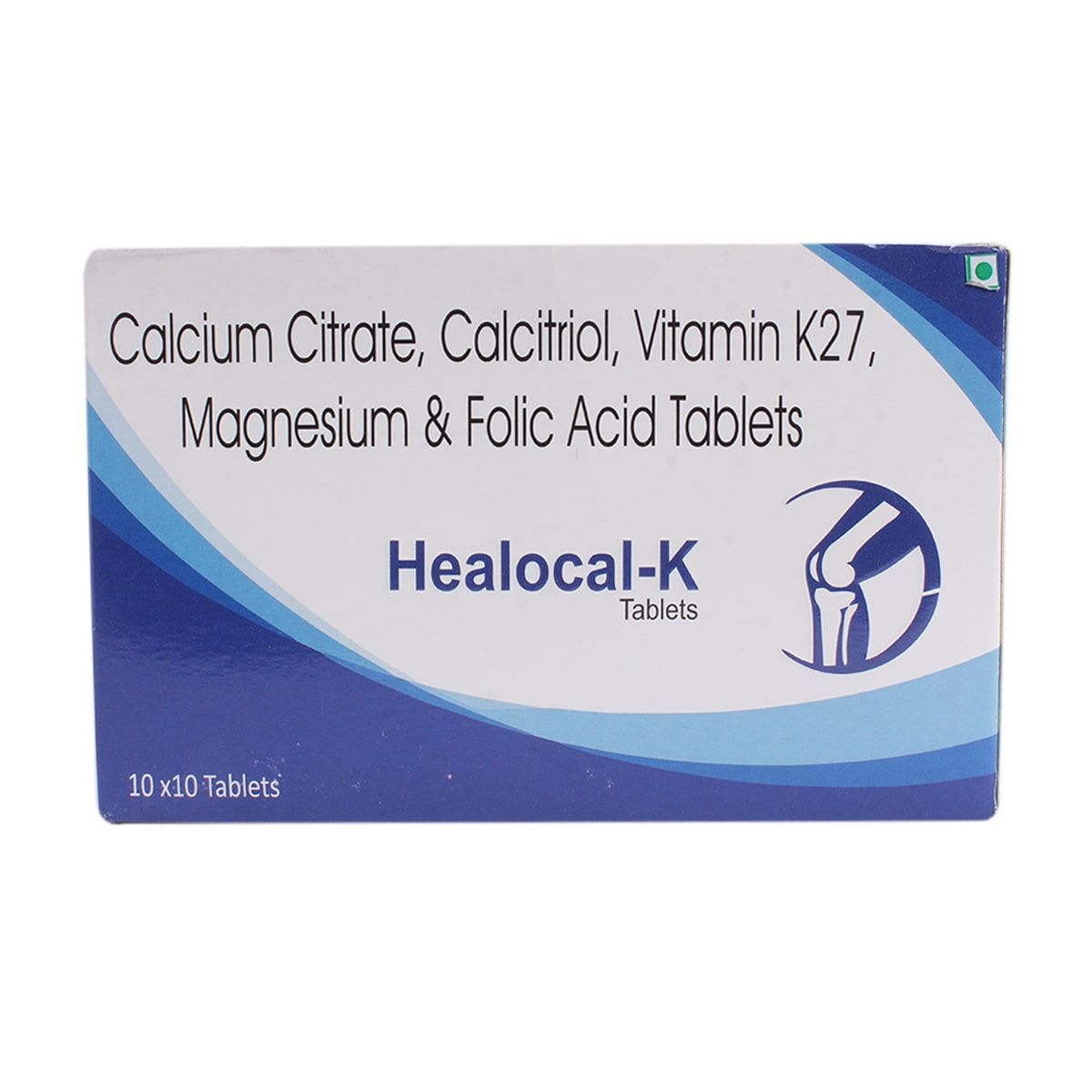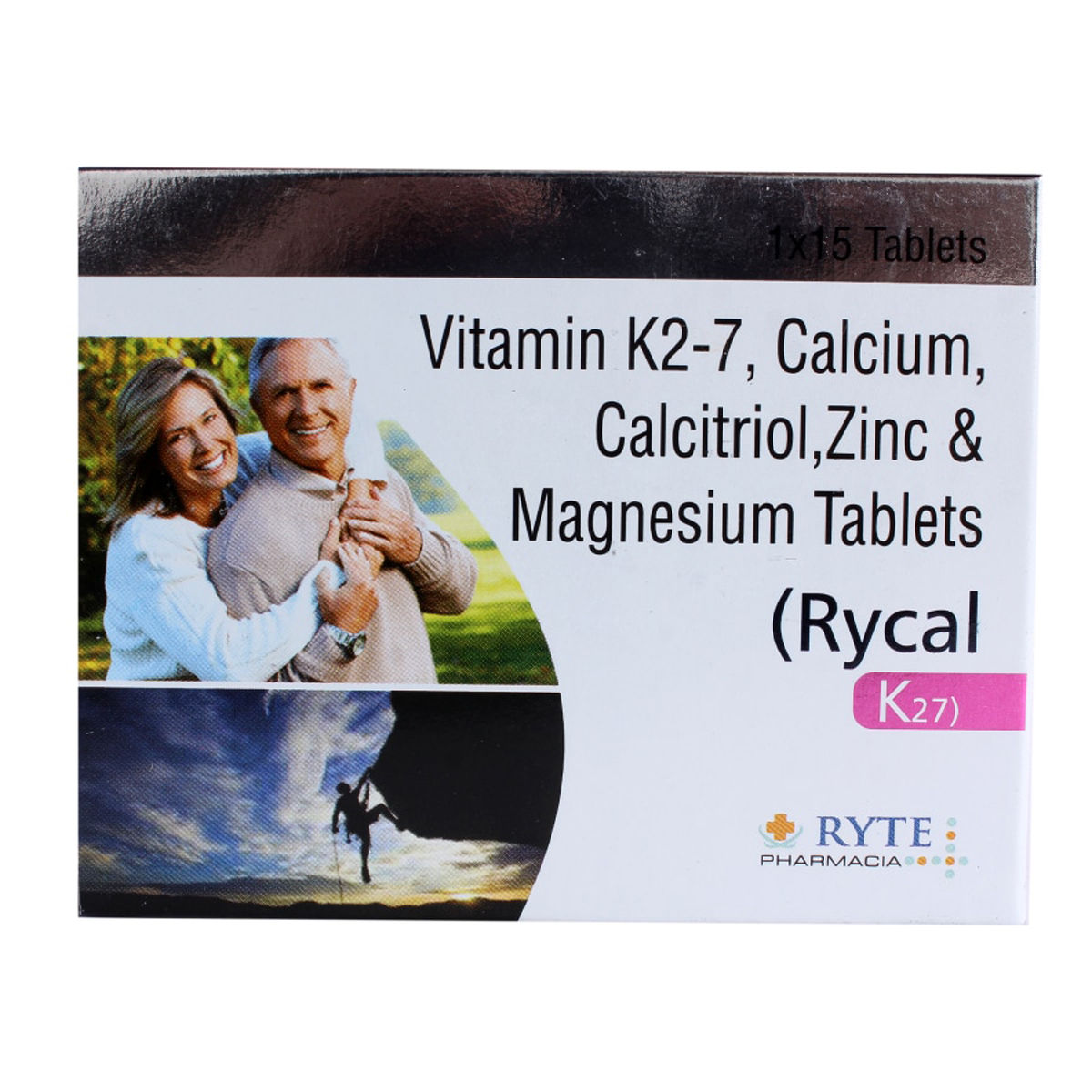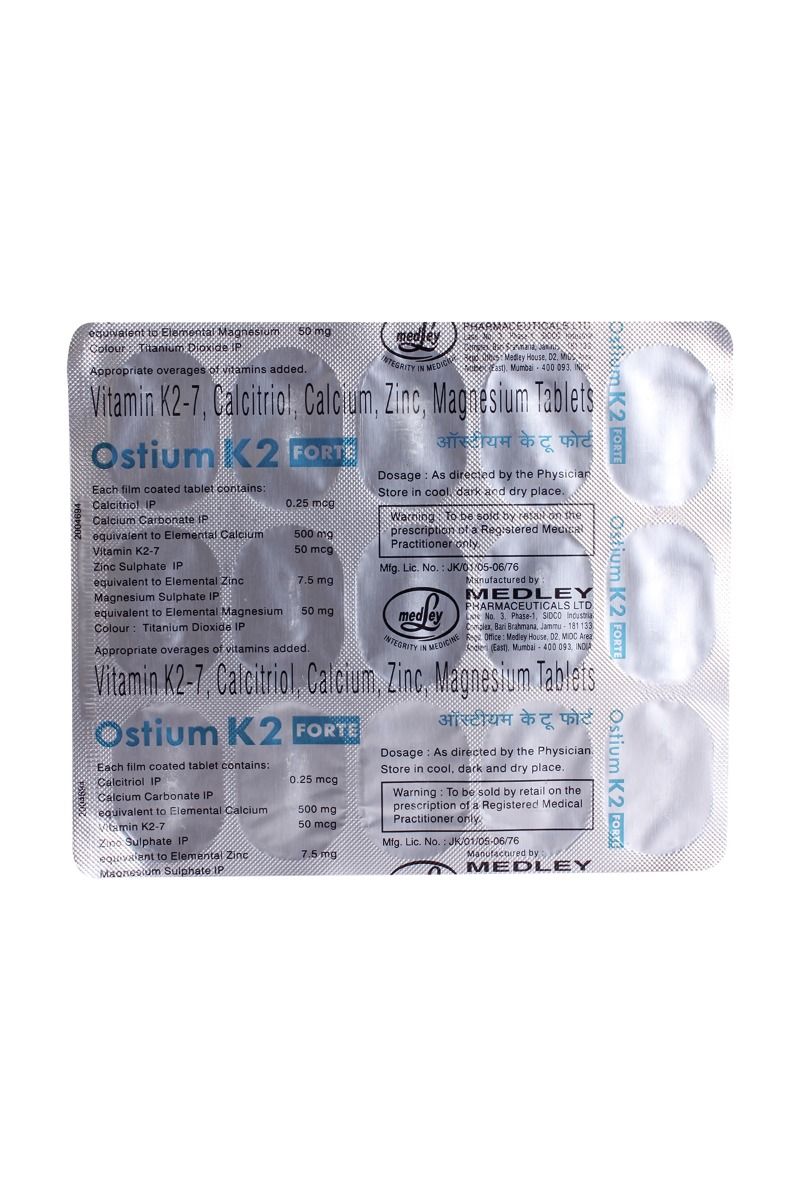CALCITRIOL+VITAMIN K+MAGNESIUM
About
CALCITRIOL+VITAMIN K+MAGNESIUM belongs to the class of 'dietary supplements primarily used to treat low blood calcium levels. CALCITRIOL+VITAMIN K+MAGNESIUM effectively treats various conditions caused by low calcium levels in the body, such as osteoporosis (weak and brittle bones), osteomalacia/rickets (weak bones), hypoparathyroidism (low levels of parathyroid hormone), and latent tetany (a muscle disease with low blood calcium levels). CALCITRIOL+VITAMIN K+MAGNESIUM can also be given to pregnant, nursing, and postmenopausal women for building and keeping their bones strong.
CALCITRIOL+VITAMIN K+MAGNESIUM consists of three medicines: Calcitriol (Vitamin D3), Vitamin K2, and Magnesium. Calcitriol is a synthetic version of Vitamin D3 and treats calcium deficiency with hypoparathyroidism (the parathyroid glands' decreased activity) and metabolic bone diseases in people with chronic kidney failure. It raises Vitamin D levels and thereby increases calcium levels in the blood. This helps in improving the absorption rate of calcium from the intestine. Vitamin K2 helps to maintain bone density by promoting calcium transport from the bloodstream into the bone. It also metabolizes calcium and activates the calcium-binding action of two proteins that help make and maintain bones. Magnesium plays an important role in converting vitamin D into its active form, which helps in calcium absorption.
You are advised to take CALCITRIOL+VITAMIN K+MAGNESIUM as recommended it. In some cases, CALCITRIOL+VITAMIN K+MAGNESIUM can cause side effects like constipation or stomach upset, nausea, vomiting, loss of appetite, mood changes, weakness, tiredness, fast or pounding heartbeat, bone/muscle pain, and headache. Most of these side effects of CALCITRIOL+VITAMIN K+MAGNESIUM do not require medical attention and gradually resolve over time. However, if these side effects persist longer, please consult your doctor.
Do not take CALCITRIOL+VITAMIN K+MAGNESIUM if you're allergic to any ingredient in it. Pregnant or breastfeeding women should consult their doctor before taking CALCITRIOL+VITAMIN K+MAGNESIUM. Higher doses of Vitamin D than the recommended daily dose should be used in pregnant women only when advised by the doctor. CALCITRIOL+VITAMIN K+MAGNESIUM may pass into the breast milk. Hence breastfeeding mothers need to seek medical advice before starting CALCITRIOL+VITAMIN K+MAGNESIUM.
Uses of CALCITRIOL+VITAMIN K+MAGNESIUM
Medicinal Benefits
CALCITRIOL+VITAMIN K+MAGNESIUM is a dietary supplement that treats low calcium levels in the blood. It consists of three medicines: Calcitriol (Vitamin D3), Vitamin K2, and Magnesium. Calcitriol is a synthetic version of Vitamin D3 and treats calcium deficiency with hypoparathyroidism (the parathyroid glands' decreased activity) and metabolic bone diseases in people with chronic kidney failure. It raises Vitamin D levels and thereby increases calcium levels in the blood. This helps in improving the absorption rate of calcium from the intestine. Vitamin K2 helps to maintain bone density by promoting calcium transport from the bloodstream into the bone. It also metabolizes calcium and activates the calcium-binding action of two proteins that help in making and maintaining bones. Magnesium plays an important role in converting vitamin D into its active form, which helps in calcium absorption.
Directions for Use
Storage
Side Effects of CALCITRIOL+VITAMIN K+MAGNESIUM
- Nausea
- Headache
- Vomiting
- Loss of appetite
- Mood changes
- Bone/muscle pain
- Weakness, tiredness
- Fast or pounding heartbeat
- Constipation or stomach upset
In-Depth Precautions and Warning
Drug Warnings
Brief your medical history if you have any heart/kidney/liver/blood vessel diseases, kidney stones, sarcoidosis (growth of inflammatory cells in different parts of the body), Crohn's disease (inflammatory bowel disease), Whipple's disease (bacterial infection affecting joints and digestive system), achlorhydria (little or no stomach acid), low levels of bile, and phosphate imbalance. Please tell your doctor if you have hypercalcemia (high calcium levels), hypervitaminosis D (high vitamin D levels), and malabsorption syndrome (difficulty absorbing nutrition from food). Chewable tablets of CALCITRIOL+VITAMIN K+MAGNESIUM may contain sugar or aspartame; hence caution should be taken to have diabetes and phenylketonuria (increased levels of an amino acid called phenylalanine).
Drug Interactions
Drug-Drug Interactions: CALCITRIOL+VITAMIN K+MAGNESIUM may interact with central nervous system stimulants (dextroamphetamine, amphetamine), anti-depressants (duloxetine), minerals (ferrous sulfate), anti-ulcer drugs (ranitidine), synthetic thyroid hormone (levothyroxine), painkillers (aspirin), calcium supplements (ergocalciferol, cholecalciferol), anti-clotting drugs (anisindione, dicumarol, warfarin), drugs treating high cholesterol levels (cholestyramine, colesevelam, colestipol), and drugs that treat high blood phosphorus levels (sevelamer). Some medications like tetracycline antibiotics (doxycycline, minocycline), quinolone antibiotics (ciprofloxacin, levofloxacin), drugs treating bone loss (alendronate), weight-loss drugs (orlistat), and anti-cancer drugs (estramustine) may affect the calcium absorption into the body.
Drug-Food Interactions: Avoid or reduce the intake of caffeine, soft drinks and alcohol that inhibit calcium absorption.
Drug-Disease Interactions: CALCITRIOL+VITAMIN K+MAGNESIUM is contraindicated in hypercalcemia, hypervitaminosis D, malabsorption syndrome, Vitamin D toxicity, heart/kidney/liver/blood vessel diseases, kidney stones, sarcoidosis, Crohn's disease, Whipple's disease, achlorhydria, low levels of bile, and phosphate imbalance.
Drug-Drug Interactions Checker List:
Safety Advice

Alcohol
cautionDrinking alcohol can affect calcium absorption; hence it is advised to limit the alcohol intake while using CALCITRIOL+VITAMIN K+MAGNESIUM.

Pregnancy
cautionCALCITRIOL+VITAMIN K+MAGNESIUM should not be used when pregnancy unless clearly necessary. So, inform your doctor if you are pregnant or suspect pregnancy. Your doctor will weigh the benefits and potential risks before recommending CALCITRIOL+VITAMIN K+MAGNESIUM.

Breast Feeding
cautionCALCITRIOL+VITAMIN K+MAGNESIUM should not be used in nursing mothers unless clearly necessary. So, inform your doctor if you are a nursing mother. Your doctor will weigh the benefits and potential risks before recommending CALCITRIOL+VITAMIN K+MAGNESIUM.

Driving
not applicableCALCITRIOL+VITAMIN K+MAGNESIUM does not impact your ability to drive or operate machinery.

Liver
cautionHepatic impairment/liver disease can alter certain Vitamin D forms' metabolic and therapeutic activity. So, let your doctor know if you have any history of liver diseases before taking CALCITRIOL+VITAMIN K+MAGNESIUM.

Kidney
cautionIt is advised to seek a doctor's advice before starting CALCITRIOL+VITAMIN K+MAGNESIUM if you have kidney diseases like kidney stones or undergoing dialysis. Calcitriol in CALCITRIOL+VITAMIN K+MAGNESIUM increases inorganic phosphate levels in serum; hence caution should be taken in patients undergoing dialysis to maintain adequate phosphorus levels and avoid ectopic calcification (calcium deposition).

Children
consult your doctorCALCITRIOL+VITAMIN K+MAGNESIUM should not be used in children without a doctor's advice.
Habit Forming
Diet & Lifestyle Advise
- Include dairy products like milk, yoghurt, cheese or milk-based custard in your diet.
- Eat a serving of broccoli, cabbage, bok choy, spinach and other green leafy vegetables daily.
- Snack on calcium-rich nuts like Brazil nuts or almonds.
- Sprinkle sesame seeds over your food, vegetables and salads. Sesame seeds are high in calcium.
- Avoid or reduce the intake of caffeine, soft drinks and alcohol that inhibit calcium absorption.
- Replace the meat with tofu or tempeh for extra calcium in your food.
Special Advise
- A low phosphate diet is recommended to control serum phosphorus levels in dialysis patients.
- Clinical monitoring of serum electrolyte concentrations and cardiac function is recommended.
Patients Concern
Disease/Condition Glossary
Osteoporosis: Osteoporosis is a bone disease that weakens and brittle bones by decreasing bone density. It happens when the body loses too much bone, makes too little bone, or both. This makes bones weak and even brittle, which can even fracture with a little bending. Symptoms of osteoporosis include loss of height over time, back pain, and soft bones that break easily.
Osteomalacia/Rickets: A bone disease caused by softening and weakening bones in children due to inadequate vitamin D.
Tetany: A disease condition due to low levels of calcium (hypocalcemia) in the body that causes cramps and spasms in the hands, feet, and larynx (voice box.
Hypoparathyroidism: It is a disease characterized by low levels of parathyroid hormone. This can cause low calcium levels and trigger tetany.
FAQs
Women of any age are much more likely to develop osteoporosis in comparison to men. As a woman becomes 50 years old or after her menopause, her bone density reduces significantly due to hormonal changes. To prevent such a situation, the first important factor is to exercise. The second factor is good to intake of micronutrients like CALCITRIOL+VITAMIN K+MAGNESIUM that improves bone health at any age.
There are certain factors also called risk factors responsible for osteoporosis (low bone mineral density and fracture of bones) that include smoking, age, gender(females are more likely to develop osteoporosis), family history, thyroid issues, low calcium intake, eating disorders, sedentary lifestyle, excessive alcohol consumption, and tobacco use.
Calcium is a nutrient that is required by all living organisms including humans for good bone health. It is required to build and maintain healthy strong bones and teeth. It plays an important role in muscle movements and maintaining communication between the brain and other parts of the body. Taking calcium with vitamins helps in its proper absorption.
The reason behind is this that women have small, thin bones in comparison to men. The second reason is when women reach menopause state there is a major drop in estrogen levels. This loss slows the rebuilding process of bones and even helo the body to lose more bone mass at a fast rate. This continues for several years after menopause and the rate of bone loss eventually returns to normal after many years. In that means time, women are at more risk of having a fracture.
CALCITRIOL+VITAMIN K+MAGNESIUM is a dietary supplement that treats low levels of calcium in the blood. It consists of three medicines, namely: Calcitriol (Vitamin D3), Vitamin K2, and Magnesium. Calcitriol is a synthetic version of Vitamin D3 and treats calcium deficiency with hypoparathyroidism (the parathyroid glands' decreased activity) and metabolic bone diseases in people with chronic kidney failure. It raises Vitamin D levels and thereby increases calcium levels in the blood. This helps in improving the absorption rate of calcium from the intestine. Vitamin K2 helps to maintain bone density by promoting calcium transport from the bloodstream into the bone. It also metabolizes calcium and activated the calcium-binding action of two proteins that help in making and maintaining bones. Magnesium plays an important role in converting vitamin D into its active form that helps in calcium absorption.
If you miss a dose, take it as soon as you remember. However, if it is time for the next scheduled dose, skip the missed dose and follow your usual dosage.
Milk is considered to be the best source of calcium. You can take CALCITRIOL+VITAMIN K+MAGNESIUM with milk.
CALCITRIOL+VITAMIN K+MAGNESIUM can cause kidney stones due to excess calcium deposition when used for a prolonged period. Please consult your doctor before taking CALCITRIOL+VITAMIN K+MAGNESIUM as a daily supplement if you have any kidney problems or a history of kidney stones
CALCITRIOL+VITAMIN K+MAGNESIUM is used to increase low levels of calcium in the body. Hence it is not advised to use CALCITRIOL+VITAMIN K+MAGNESIUM during hypercalcemia, since it causes the overdose of calcium leading to kidney stones and other effects.
Calcitriol in CALCITRIOL+VITAMIN K+MAGNESIUM can increase inorganic phosphate levels in serum; hence it should be cautiously used in patients undergoing dialysis to maintain adequate phosphorus levels and avoid ectopic calcification (calcium deposition). It is advised to follow a low phosphate diet to control serum phosphorus levels in patients undergoing dialysis.

